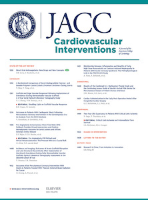
JACC-Cardiovascular Interventions
Scope & Guideline
Leading the Charge in Cardiovascular Intervention Knowledge
Introduction
Aims and Scopes
- Transcatheter Valve Interventions:
This area covers innovations and outcomes related to transcatheter aortic valve replacement (TAVR), transcatheter mitral valve repair/replacement, and tricuspid valve interventions, showcasing techniques like edge-to-edge repair and valve-in-valve procedures. - Coronary Intervention Techniques:
Research in this scope addresses the development and optimization of percutaneous coronary interventions (PCI), including the use of drug-coated balloons, stent technologies, and techniques for chronic total occlusion (CTO) recanalization. - Cardiovascular Imaging and Guidance:
This focus area emphasizes the role of imaging modalities such as intravascular ultrasound (IVUS), optical coherence tomography (OCT), and computed tomography (CT) in guiding interventional procedures and assessing outcomes. - Clinical Outcomes and Risk Assessment:
This scope includes studies on the prognostic implications of various interventions, patient selection criteria, and risk models for patients undergoing interventional procedures, particularly in high-risk groups. - Transcatheter Therapies for Structural Heart Disease:
Research on the application of transcatheter techniques for structural heart disease management, including edge-to-edge repairs and valve replacements in various anatomical and pathological contexts. - Innovative Technologies and Devices:
The journal highlights the development of novel devices and technologies, including new stent designs, delivery systems, and adjunctive therapies aimed at improving procedural safety and effectiveness.
Trending and Emerging
- Integration of Artificial Intelligence:
There is a growing interest in the application of artificial intelligence (AI) for predicting outcomes, guiding interventions, and personalizing treatment plans, indicating a technological shift in cardiology. - Minimally Invasive Techniques:
Research focusing on minimally invasive procedures, particularly in the context of transcatheter interventions, is on the rise, reflecting a broader trend towards reducing patient morbidity. - Patient Selection and Personalized Medicine:
There is an increasing emphasis on the importance of personalized medicine in interventional cardiology, with studies exploring how specific patient characteristics influence treatment outcomes. - Use of Novel Biomarkers:
Emerging research is focusing on new biomarkers for predicting patient outcomes and guiding therapy, indicating a trend towards more tailored cardiovascular interventions. - Comprehensive Assessment of Valve Disease:
An increased focus on the comprehensive assessment of valve disease, including multi-valve involvement and the integration of various treatment modalities, is becoming more prominent in recent publications.
Declining or Waning
- Conventional Surgical Techniques:
There is a noticeable decline in research focused on traditional surgical techniques for valve replacements, as the field moves towards less invasive transcatheter approaches. - Long-term Outcomes of Older Devices:
As newer technologies and devices gain prominence, studies focusing on older devices and their long-term outcomes are becoming less frequent, indicating a shift towards evaluating contemporary solutions. - Basic Cardiovascular Physiology Studies:
Research that purely focuses on basic cardiovascular physiology without direct application to interventional techniques is less frequently represented, as the emphasis shifts towards clinical applications and outcomes. - Single-Center Studies:
There seems to be a decline in single-center studies, as multicenter and larger registry studies are preferred for their robustness and generalizability. - Generic Comparisons of Antiplatelet Therapies:
Comparative studies on generic antiplatelet therapies are less common as more complex, individualized approaches to treatment emerge, prioritizing patient-specific factors.
Similar Journals

Cardiology Journal
Elevating standards in heart health scholarship.Cardiology Journal, published by VIA MEDICA, stands as a prominent resource in the field of cardiology and cardiovascular medicine, with an ISSN of 1897-5593 and an E-ISSN of 1898-018X. Recognized for its Open Access model established since 1994, this journal facilitates widespread dissemination of critical research findings, allowing practitioners and researchers globally to access valuable insights without barriers. Based in Poland, with an address at UL SWIETOKRZYSKA 73, 80-180 GDANSK, it has achieved a respectable Q2 classification in 2023 for both Cardiology and Miscellaneous Medicine categories, reflecting its influence and quality within the scholarly community. With a Scopus ranking placing it at #117 out of 387 in Cardiology, it lies within the 69th percentile, underpinning its commitment to advancing knowledge in cardiovascular health. The journal’s converged years extending from 2006 to 2024 ensure it captures ongoing developments in a rapidly evolving field. As such, the Cardiology Journal serves as an indispensable platform for researchers, professionals, and students dedicated to exploring the frontiers of cardiac science and improving patient care.
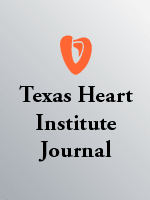
TEXAS HEART INSTITUTE JOURNAL
Illuminating the Future of Cardiovascular Medicine.TEXAS HEART INSTITUTE JOURNAL, published by the renowned Texas Heart Institute, stands as a pivotal resource in the field of cardiology and cardiovascular medicine. With a history spanning over four decades since its establishment in 1982, this journal addresses a wide range of topics within its scope, including clinical studies, innovative treatments, and groundbreaking research in heart health. Despite its Q3 ranking in both Cardiology and Cardiovascular Medicine, the journal is committed to fostering advancement in medical knowledge and practice, providing an essential platform for healthcare professionals and researchers alike. While currently lacking open access, the journal is recognized for its contributions to the field, aiming to illuminate critical healthcare discussions and promote the exchange of ideas. For those interested in staying at the forefront of cardiovascular research, TEXAS HEART INSTITUTE JOURNAL offers invaluable insights and the latest developments shaping the future of heart care.

JOURNAL OF INVASIVE CARDIOLOGY
Discovering New Horizons in Invasive CardiologyJOURNAL OF INVASIVE CARDIOLOGY, a reputable publication by H M P COMMUNICATIONS, is dedicated to advancing the field of cardiology and cardiovascular medicine through rigorous research and scholarly discussion. With an ISSN of 1042-3931 and an E-ISSN of 1557-2501, this journal serves as a crucial resource for healthcare professionals, researchers, and students who seek to stay informed about the latest findings and innovations in invasive cardiology. Having achieved a 2023 Scopus rank of #185 out of 636 in General Medicine, placing it in the 70th percentile, the journal is recognized for its significant contributions to medical science, evidenced by its Q2 ranking in Radiology, Nuclear Medicine and Imaging, and Q3 status in both Cardiology and Cardiovascular Medicine. The journal has been in circulation since 1990 and continues to foster a platform for critical research in the United States, ensuring accessibility to vital information necessary for enhancing patient care and clinical practices within the domain of invasive procedures.
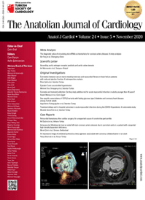
Anatolian Journal of Cardiology
Advancing Cardiac Research Through Open Access Excellence.The Anatolian Journal of Cardiology, published by KARE PUBL, stands as a vital resource in the field of Cardiology and Cardiovascular Medicine. With an ISSN of 2149-2263 and E-ISSN 2149-2271, this Open Access journal has been fostering the dissemination of critical research since 2001, ensuring that high-quality content is freely available to a global audience. Based in Turkey, the journal aims to bridge gaps in cardiological knowledge through rigorous peer-reviewed articles that span a wide range of topics, from innovative clinical practices to groundbreaking research findings. While its current ranking places it in the Q3 category of cardiology journals, the Anatolian Journal of Cardiology continues to strive towards enhancing its impact, currently holding a Scopus rank of 236 out of 387. Researchers, practitioners, and students alike will find this journal an essential platform for keeping abreast of the latest developments in cardiovascular health.

Netherlands Heart Journal
Leading the Way in Cardiovascular Research and PracticeNetherlands Heart Journal is a premier academic publication dedicated to advancing knowledge in the field of cardiology and cardiovascular medicine. Published by BOHN STAFLEU VAN LOGHUM BV, this journal has established itself as a critical platform for researchers, professionals, and students seeking to explore groundbreaking findings and innovative practices in cardiovascular health. With an ISSN of 1568-5888 and E-ISSN 1876-6250, the journal boasts a respectable Q2 ranking in the Cardiology and Cardiovascular Medicine category, placing it in the top half of its field according to the 2023 quartiles. The Scopus ranking places it 130th out of 387 in the relevant category, indicating a commendable percentile rank of 66th, which attests to its influence and quality of published research. Spanning from 2005 to 2024, the journal endeavors to include a diverse array of topics, encompassing clinical practice, technological innovations, and public health considerations related to cardiovascular diseases. Researchers and practitioners are encouraged to engage with the journal's robust content, contributing to and benefiting from the collaborative effort to enhance cardiovascular health worldwide.
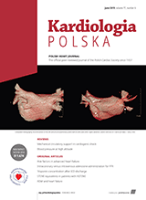
Kardiologia Polska
Innovative Research for a Healthier TomorrowKardiologia Polska, the esteemed journal of the Polish Cardiac Society, has established itself as a vital resource in the field of cardiology and cardiovascular medicine since its inception in 1954. With an ISSN of 0022-9032 and an E-ISSN of 1897-4279, this journal serves as a platform for groundbreaking research and scholarly articles that contribute to the advancement of heart health. Although currently not an open access journal, it remains an essential reference for practitioners and researchers seeking to stay abreast of the latest developments in cardiovascular science. The journal reflects its scholarly depth through a Category Quartile of Q3 and a commendable Scopus ranking at the 48th percentile in its field. Published primarily in Poland, it caters to a global audience eager to explore comprehensive studies spanning clinical cardiology, innovative therapeutic approaches, and emerging cardiovascular trends. Join a thriving academic community by engaging with the invaluable insights and research contributions found within the pages of Kardiologia Polska.
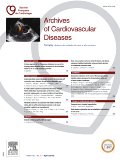
Archives of Cardiovascular Diseases
Transforming the future of cardiology with innovative insights.The Archives of Cardiovascular Diseases, published by Elsevier Masson, stands as a leading journal in the field of cardiology and cardiovascular medicine, with an impressive impact factor that underscores its relevance and influence. This esteemed journal, recognized in the Q2 category for both cardiology and miscellaneous medicine, aims to disseminate groundbreaking research, innovative methodologies, and clinical advancements that can shape the future of cardiovascular health. With its diverse array of open access options, researchers and students alike have the ability to engage with high-quality content, ensuring that cutting-edge findings are accessible globally. Since its inception in 2008, the journal has actively contributed to the advancement of knowledge in cardiovascular diseases, fostering collaboration among clinicians, researchers, and educators. Headquartered in Paris, France, Archives of Cardiovascular Diseases remains committed to enhancing our understanding of cardiovascular health and improving patient outcomes worldwide.

Nepalese Heart Journal
Exploring Innovations in Heart Disease ManagementNepalese Heart Journal, published by the CARDIAC SOC NEPAL, serves as a premier platform for disseminating knowledge in the field of cardiology and cardiovascular health. With an ISSN of 2091-2978, this journal aims to bridge the gap between researchers, clinicians, and academicians by presenting high-quality, peer-reviewed articles that address clinical practices, innovative research, and emerging trends in heart disease management, especially within the context of Nepal and the surrounding region. Although it operates under a traditional publishing model, its commitment to excellence aids in reinforcing the scientific discourse in an area critical to public health. The journal is a valuable resource for professionals and students alike who are focused on advancing their understanding of cardiology and its implications for health policy and practice. Exploring the intersections of local challenges and global advancements in heart health, the Nepalese Heart Journal is poised to contribute meaningfully to the evolving landscape of cardiovascular research.

CANADIAN JOURNAL OF CARDIOLOGY
Advancing Cardiovascular Knowledge Since 1985Canadian Journal of Cardiology (ISSN: 0828-282X, E-ISSN: 1916-7075), published by Elsevier Science Inc, serves as a vital platform for disseminating high-quality research in the dynamic field of cardiology and cardiovascular medicine. Since its inception in 1985, this journal has established itself as a leader in the field, currently holding a prestigious Q1 ranking in Cardiology, indicating its significant impact and contribution to medical science. With a Scopus rank of #50 out of 387 in its category and placing in the 87th percentile, the journal showcases rigorous peer-reviewed articles that advance knowledge and practice in cardiology. Although the journal is not open access, it provides valuable insights and research findings that cater to clinicians, researchers, and students who are committed to improving cardiovascular health. As we approach the convergence of years to 2024, the Canadian Journal of Cardiology continues to strive for excellence, facilitating a discourse vital for both academic and clinical advancements in cardiology.

Heart International
Exploring innovative insights in cardiology and cardiovascular medicine.Heart International is a prominent open-access journal dedicated to the fields of cardiology and cardiovascular medicine, published by TOUCH MEDICAL MEDIA LTD since 2006. Based in Italy, this journal serves as a vital platform for researchers, clinicians, and students, aiming to disseminate cutting-edge scientific findings and clinical insights that advance the understanding of heart health. With an ISSN of 2036-2579 and an emphasis on accessible content, Heart International ensures that valuable research is available to a wide audience, thereby contributing to the global discourse on cardiovascular issues. Although it currently holds a Q4 quartile ranking in its category and is positioned in the lower percentile for Scopus rankings, the journal is committed to improving its impact through rigorous peer review and high-quality publications. The journal covers a wide array of topics within the cardiology domain, making it an essential resource for those looking to stay abreast of the latest developments in heart research.